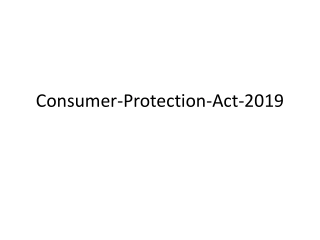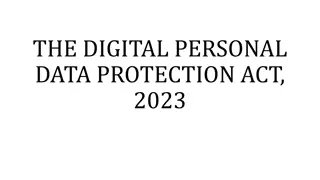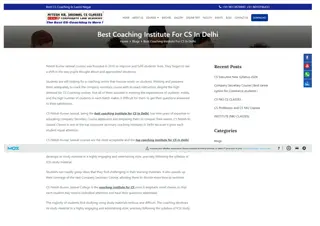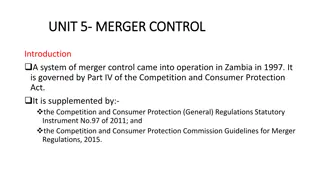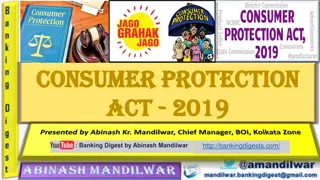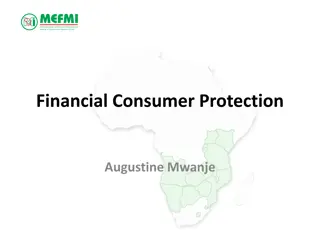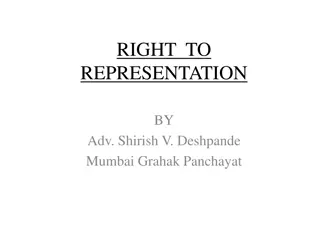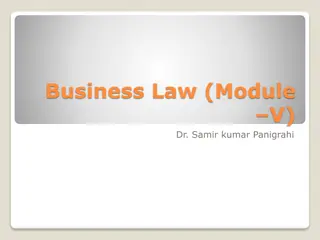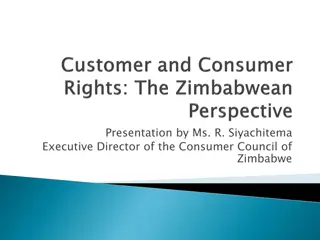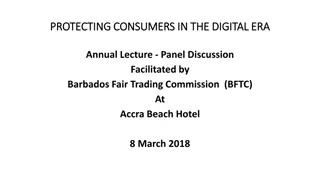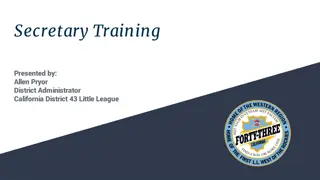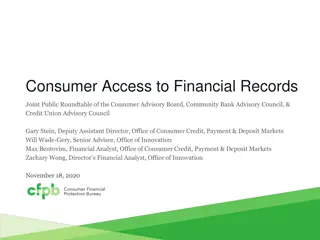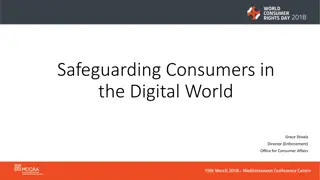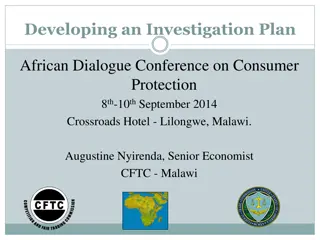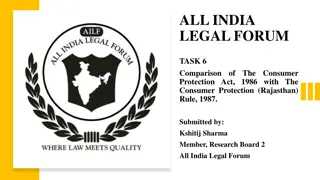Opportunities for Company Secretary in Consumer Protection Act
Enacted to protect consumer interests, the Consumer Protection Act of 1986 applies to all of India except Jammu and Kashmir. Learn about who qualifies as a consumer and recent legal precedents regarding company registrations. Explore potential opportunities for company secretaries in this area.
Download Presentation

Please find below an Image/Link to download the presentation.
The content on the website is provided AS IS for your information and personal use only. It may not be sold, licensed, or shared on other websites without obtaining consent from the author.If you encounter any issues during the download, it is possible that the publisher has removed the file from their server.
You are allowed to download the files provided on this website for personal or commercial use, subject to the condition that they are used lawfully. All files are the property of their respective owners.
The content on the website is provided AS IS for your information and personal use only. It may not be sold, licensed, or shared on other websites without obtaining consent from the author.
E N D
Presentation Transcript
Opportunities for Company Secretary Under Consumer Protection Act C.S. Nityanand Singh Partner NAKS NAKS & PARTNERS & PARTNERS ADVOCATES & SOLICITORS ADVOCATES & SOLICITORS 28/142, Ground Floor, West Patel Nagar, New Delhi-110008 M: 9999130332, 9350558186 Email: nitya@nakslaw.com
*CONSUMER PROTECTION ACT, 1986 Enacted to provide for the better protection of the interest of consumer Act applies to whole of India except Jammu and Kashmir Chapter I, II and IV came into force on 15.4.1987. Chapter III came into force on 1.7.1987 The act was amended in 2002 and the amendments came into force w.e.f. 15th March 2003.
*WHO IS A CONSUMER [2(1) (d)]? Any person who buys goods or avails services for consideration Consideration may be fully paid, partially paid or fully promised to be paid or partially promised to be paid Any body who uses the goods or services with the consent of the consumer but
*WHO IS A CONSUMER ? Does not include any person who buys goods for resale or commercial purpose and services for commercial purpose However any person who buys goods for commercial use but exclusively for his livelihood by means of self employment is a consumer. Legal heir of consumer in case death of consumer
Karnataka Power vs. Ashok Iron Works Private Limited, (S.C.) Decided on : 9th February, 2009 The Supreme Court has decided that the person includes a company therefore the company registered under the Companies Act is a consumer and can file a complaint before the consumer Forum/ Commission. Section 2 (1) (m)
C. Venkatachalam vs. Ajitkumar C. Shah & Ors. (S.C.) Decided on :- 29th August, 2011 In this complaint filed before the Consumer Forum, Mumbai in which the district consumer forum held that on authorised agent has no right to act and plead before the consumer forum and some other forums has decided that non advocates can appear then the issue was taken to the state commission and the state commission has reverse the view, therefore the large no of the cases where the authorised agents were appearing had come to stand still . the State Commission order was challenged in two writ petitions before the Bombay High Court. The petitions were allowed by the Division Bench. The High Court in the impugned judgment held that a party before the District Consumer Forum/State Commission cannot be compelled to engage services of an advocate. The order of the High Court was confirmed by the Supreme court.
HIERARCHY DISTRICT FORUM STATE COMMISSION NATIONAL COMMISSION SUPREME COURT
CONSUMER PROTECTION ACT LEGAL NOTICE COMPLAINT (Section 12 -Two Years) JURISDICTION TERRITORIAL JURISDICTION PECUNIARY JURISDICTION
TERRITORIAL JURISDICTION (Section 11 of Consumer Protection Act, 1986) Where the cause of action, wholly or in part, arises Where Opposite Party(ies) actually or voluntarily resides Where Opposite Parties carries on business or has a branch office
Cases on Territorial Jurisdiction Subodh Kumar Baheti vs. Delhi Development Authority, 29th October, 2012 (NCDRC) Petitioner Subodh Kumar Baheti who is resident of Bhilwara, Rajasthan filed a consumer complaint before the District Consumer Disputes Redressal Forum, Bhilwara, Rajasthan against the OPs No.1 & 2, namely, Delhi Development Authority, New Delhi and Nodal Branch of ICICI Bank, Green Park Extension, New Delhi who are respondents No.1 & 2 respectively herein. After hearing both the parties and looking into the matter, it was decided by the National Consumer Disputes Redressal as:- Forum dismissed the complaint on the ground that since the opposite parties did not reside under the jurisdiction of the District Forum and the cause of action also did not arise in its jurisdiction and hence the District Forum did not have jurisdiction to deal with the complaint. Conclusion:- the complainant cannot invoke the jurisdiction of Consumer forum on the basis of his residence.
Dinesh Kumar vs. Manager, Oriental Insurance Decided on 21 May, 2014 (SCDRC) The grievance of the complainant in his complaint was that his vehicle bearing registration No.DL-1LG-8355 was insured with the Oriental Insurance Company Limited (respondent No.1 herein) for the period August 31st, 2007 to August 30th, 2008. The vehicle was got financed from the respondent No.2. The vehicle met with an accident on March 27th, 2008 in the area of Police Station Milk, District Rampur (U.P.). The appellant gave application to the Police but no FIR was registered. However, the police issued a certified copy of that application to him. The appellant also gave intimation to the respondents. The respondents deputed a surveyor, who took photographs of the damaged vehicle. The service center prepared an estimate of Rs.3,95,036/- of the damaged vehicle. The appellant did not settle his claim. The compliant filled before the Faridabad and the same was dismissed on the ground that policy has taken from Delhi office and the cause of action arises at Rampur UP therefore the District Forum , Faridabad has no jurisdiction to entertain the Complaint under ground that the reside of complainant Is at Faridabad.
M/S. Sonic Surgical vs. National Insurance Company Ltd on 20 October, 2009 (S.C.) o It appears that there was a fire on 13-14th February, 1999 at 10.00 p.m. in the go down of the appellant at Ambala. For claiming compensation, the appellant filed a claim petition before the Consumer Commission of the Union Territory, Chandigarh constituted under Section 17 of the Consumer Protection Act, 1986 (hereinafter for short 'the Act'). The said claim petition filed by the appellant herein was allowed by the Consumer Commission of the Union Territory, Chandigarh. On appeal, the NCDRC allowed the appeal of the respondent herein on the ground that the Consumer Commission at Chandigarh had no jurisdiction to entertain and adjudicate the complaint. We are in agreement with the view taken by the NCDRC. o In our opinion, no part of the cause of action arose at Chandigarh. It is well settled that the expression 'cause of action' means that bundle of facts which gives rise to a right or liability. In the present case admittedly the fire broke out in the go down of the appellant at Ambala. The insurance policy was also taken at Ambala and the claim for compensation was also made at Ambala. Thus no part of the cause of action arose in Chandigarh. o No doubt this would be departing from the plain and literal words of Section 17(2)(b) of the Act but such departure is sometimes necessary (as it is in this case) to avoid absurdity. In the present case, since the cause of action arose at Ambala, the State Consumer Redressal Commission, Haryana alone will have jurisdiction to entertain the complaint.
PECUNIARY JURISDICTION (Section 11 of Consumer Protection Act, 1986) Where the value of the goods or services and compensation, if any, claimed does not exceed Rupees twenty lakhs (District Forum). Exceeds Rs. Twenty Lakhs but does not exceed Rs. One Crore (State Commission - Section 17) Exceeds Rs. One Crore (National Commission) Section 21 Quality Foils India Private Limited vs. Bank od Madura Ltd. And Anr., Decided on 30th May, 1996 (NCDRC) Held, the criteria determining valuation for jurisdiction purpose is to refer it to the quantum of relief put together i.e. the aggregate value of goods, service and compensation as the case may be by the aggrieved consumer the result of claim that may be ultimately granted is not to be taken into consideration for this purpose Therefore the above case was clearly fell within the jurisdiction of the state commission and appeal allowed case remanded to the state Commission for retrial of the compliant on merits in accordance with the law.
KISHORI LAL BABLANI vs. M/S. ADITYA ENTERPRISE & 4 ORS. Decided on 29th May, 2012 (NCDRC) The complainant in the present case is seeking possession of the said flat and, therefore, for all intent and purposes, value of the flat in question should be considered as the same on which the complainant had agreed to purchase the flat. The complainant mainly seeks the possession of the flat in question which he purchased at a price of Rs.40,70,000/- besides some interest and compensation. We are, therefore, of the considered opinion that valuation of the claim made by the complainant cannot in any case exceed Rupees One crore. As per the provisions of Consumer Protection Act, 1986, a complaint where claim is upto Rupees One crore, is to be filed before the State Commission having jurisdiction in the matter. We, therefore, hold that this Commission has no pecuniary jurisdiction to entertain and try the present complaint.
Ambrish Kumar Shukla and Ors. vs. Ferrous Infrastructure Pvt. Ltd. ORS. Decided on 7th October, 2016 (NCDRC) The primary object behind permitting a class action such as a complaint under Section 12(1)(c) of the Consumer Protection Act being to facilitate the decision of a consumer dispute in which a large number of consumers are interested, without recourse to each of them filing an individual complaint, it is necessary that such a complaint is filed on behalf of or for the benefit of all the persons having such a community of interest. A complaint on behalf of only some of them therefore will not be maintainable. If for instance, 100 flat buyers/plot buyers in a project have a common grievance against the Builder/Developer and a complaint under Section 12(1)(c) of the Consumer Protection Act is filed on behalf of or for the benefit of say 10 of them, the primary purpose behind permitting a class action will not be achieved, since the remaining 90 aggrieved persons will be compelled either to file individual complaints or to file complaints on behalf of or for the benefit of the different group of purchasers in the same project. This, in our view, could not have been the Legislative intent. Continued on next slide ..
To be continued.. It is evident from a bare perusal of Sections 21, 17 and 11 of the Consumer Protection Act that it's the value of the goods or services and the compensation, if any, claimed which determines the pecuniary jurisdiction of the Consumer Forum. The Act does not envisage determination of the pecuniary jurisdiction based upon the cost of removing the deficiencies in the goods purchased or the services to be rendered to the consumer. Therefore, the cost of removing the defects or deficiencies in the goods or the services would have no bearing on the determination of the pecuniary jurisdiction. If the aggregate of the value of the goods purchased or the services hired or availed of by a consumer, when added to the compensation, if any, claimed in the complaint by him, exceeds Rs. 1.00 Crore, it is this Commission alone which would have the pecuniary jurisdiction to entertain the complaint. For instance if a person purchases a machine for more than Rs. 1.00 Crore, a manufacturing defect is found in the machine and the cost of removing the said defect is Rs. 10.00 Lacs, it is the aggregate of the sale consideration paid by the consumer for the machine and compensation, if any, claimed in the complaint which would determine the pecuniary jurisdiction of the Consumer Forum. Similarly, if for instance, a house is sold for more than Rs. 1.00 crore, certain defects are found in the house, and the cost of removing those defects is Rs. 5.00 Lacs, the complaint would have to be filed before this Commission, the value of the services itself being more than Rs. 1.00 crore. The interest has to be taken into account for the purpose of determining the pecuniary jurisdiction of a Consumer Forum.
AMRAPALI SAPPHIRE FLAT BUYERS WELFARE ASSOCIATION vs. AMRAPALI SAPPHIRE DEVELOPERS PVT. LTD. Decided On: 30th August, 2016 (NCDRC) The registered consumer association can filed a compliant before the consumer Fora commission Section 2 (1) (b) .
If non appears on behalf of complainant / Opposite Party Opposite Party Complainant Dismiss in default Where an order is passed by the National Commission dismissing the complaint in default, the aggrieved party may apply to the National commission to restore the compliant in the interest of justice. Section 22A of Consumer Protection Act Ex-parte order Where an order is passed by the National Commission ex parte against the opposite party, the aggrieved party may apply to the National Commission to set aside the said order in the interest of justice. Section 22A of Consumer Protection Act
Rajeev Hitendra Pathak & amp; Others vs. Achyut Kashinath Karekar & Another (2011) (S.C.) On careful analysis of the provisions of the Act, it is abundantly clear that the Tribunals are creatures of the Statute and derive their power from the express provisions of the Statute. The District Forums and the State Commissions have not been given any power to set aside ex parte orders and power of review and the powers which have not been expressly given by the Statute cannot be exercised.
If non appears on behalf of complainant / Opposite Party Complainant Opposite Party EX PARTE Dismissed in default District Forum District Forum Appeal Appeal State Commission State Commission Appeal Appeal National Commission National Commission
WRITTEN STATEMENT / REPLY The written statement or reply of the case to be submitted within a period of thirty days or such extended period not exceeding fifteen days as may be directed by the district forum from the date of receiving of copy of Compliant. (Section 13(1)(a)) Dr. J.J. Merchant & Ors. Vs. Shrinath Chaturvedi (S.C.) Decided : 2002 The three judge bench at this court - the National Commission or the State Commission is empowered to follow the said procedure. From the aforesaid Section it is apparent that on receipt of the complaint, the opposite party is required to be given notice directing him to give his version of the case within a period of 30-days or such extended period not exceeding 15 days as may be granted by the District Forum or the Commission. For having speedy trial, this legislative mandate of not giving more than 45 days in submitting the written statement or the version of the case is required to be adhered. If this is not adhered, the legislative mandate of Disposing of the cases within three or five months would be defeated.
NEW INDIA ASSURANCE CO. LTD. vs. HILLI MULTIPURPOSE COLD STORAGE PVT. LTD. (S.C.), Decided : 2013 We are, therefore, of the view that the judgment delivered in the case of Dr. J.J. Merchant (supra) holds the field and therefore, we reiterate the view that the District Forum can grant a further period of 15 days to the opposite party for filing his version or reply and not beyond that.. Kailash vs. Nanhku & Ors. [(2005) 4 SCC 480] the view taken in this matter was not affirmed and the view taken in JJ Merchant was affirmed.
RELIANCE GENERAL INSURANCE CO LTD AND ANR vs. M/S MAMPEE TIMBERS AND HARDWARES PVT LTD AND ANR (S.C.) Decided: 2017 The question involved in this appeal is whether the time stipulated under Section 13 of the Consumer Protection Act, 1986 for filing written statement is mandatory and whether no flexibility is available with the Court in the interest of justice. we consider it appropriate to direct that pending decision of the larger bench, it will be opened to the concerned FORA to accept the Written Statement filed beyond the stipulated time of 45 days in an appropriate case, on suitable terms, including the payment of costs, to proceed with the matter.
Rejoinder (Its not Mandatory but Subject to filling) Evidence by complainant Evidence by Opposite Party Written Argument by both the parties Final Argument
STATE COMMISSION JURISDICTION Original Jurisdiction Appellate Jurisdiction If the value of goods or services and compensation is more than 20 Lac but less than Rs. 1 Crore If the value of goods or services and compensation is more than 20 Lac but less than 50 Lac than Complaint to be filed along with a fees of Rs. 2000/- in form of demand draft If the value of goods or services and compensation is more than 50 Lac but less than 1 Crore than Complaint to be filed along with a fees of Rs. 4000/- in form of demand draft Any person aggrieved by order made by District Forum, an appeal to be filed within 30days to the State Commission. Provided 50% of such amount or Rs. 25,000/- , whichever is less to be deposited in form of Fixed Deposit in favour of Commission. Notice (to be continued on next Slide) Continued on next Slide
Notice If not filed within 30 days then move an application for condonation of delay Delay Notice issued to the Opposite party on Application Delay condoned or Appeal dismissed Application for Stay Either 50 or 100 percent decreed amount to be deposited and matter to be fixed for Final Argument District Forum records may be called Note :- Only one appeal is allowed in CPA.
NATIONAL COMMISSION JURISDICTION Original Jurisdiction Appellate Jurisdiction If the value of goods or services and compensation is more than Complaint to be filed along with fees of Rs. 5000/- in form of demand (Section 21) Any person aggrieved by order made by State Commission, an appeal to be filed within 30 days Commission. Provided 50% of such amount or Rs. 35,000/-, whichever is less to be deposited in form of Fixed Deposit in favour of Forum. to the National 1Crore than draft Aggrieved party may file an appeal against the order of National Commission (Original Jurisdiction) before the Supreme Court within a period of 30 Days from the date of receiving of order.
CRUX OF APPEAL DISTRICT FORUM (Section 12) Appeal (30 DAYS) ORIGINAL JURISDICTION Section 17 STATE COMMISSION (Section 15) APPEAL (Section19) (30 DAYS) REVISION Reg. 14 CPR,2005 (90 DAYS) NATIONAL COMMISSION ORIGINAL JURISDICTION Section 21 APPEAL (Section23) (30 DAYS) REVISION IN FORM Art. 136 of COI OF SLP (90 DAYS) SUPREME COURT
Aftab Singh V. Emaar MGF Land Limited & Anr., (NCDRC) 13 July, 2017 In view of the afore-going discussion, we arrive at the following conclusions: I. the disputes which are to be adjudicated and governed by statutory enactments, established for specific public purpose to sub-serve a particular public policy are not arbitrable; II. there are vast domains of the legal universe that are non-arbitrable and kept at a distance from private dispute resolution; III. the subject amendment was meant for a completely different purpose, leaving status quo ante unaltered and subsequently reaffirmed and restated by the Hon ble Supreme Court; (iv)Section 2(3) of the Arbitration Act recognizes schemes under other legislations that make disputes non-arbitrable and IV. in light of the overall architecture of the Consumer Act and Court-evolved jurisprudence, amended sub-section (1) of Section 8 cannot be construed as a mandate to the Consumer Forums, constituted under the Act, to refer the parties to Arbitration in terms of the Arbitration Agreement. Consequently, we unhesitatingly reject the arguments on behalf of the Builder and hold that an Arbitration Clause in the afore-stated kind of Agreements between the Complainants and the Builder cannot circumscribe the jurisdiction of a Consumer Fora, notwithstanding the amendments made to Section 8 of the Arbitration Act.
EXCLUSIVE JURISDICTION M/S Interglobe Aviation Ltd vs. N. Satchidanand on 4 July, 2011 (S.C.) Each and every provision of Chapter VIA of LSA Act emphasizes that is the Permanent Lok Adalat is a Special Tribunal which is not a `court'. As noted above, Section 22C of the LSA Act provides for anapplication to the Permanent Lok Adalat in regard to a dispute before the dispute is brought before any court and that after an application is made to the Permanent Lok Adalat, no party to the application shall invoke the jurisdiction of any court in the same dispute, thereby making it clear that Permanent Lok Adalat is distinct and different from a court. The nature of proceedings before the Permanent Lok Adalat is initially a conciliation which is non- adjudicatory in nature. Only if the parties fail to reach an agreement by conciliation, the Permanent Lok Adalat mutates into an adjudicatory body, by deciding the dispute. In short the procedure adopted by Permanent Lok Adalats is what is popularly known as `CON-ARB' (that is "conciliation cum arbitration") in United States, where the parties can approach a neutral third party or authority for conciliation and if the conciliation fails, authorize such neutral third party or authority to decide the dispute itself, such decision being final and binding. The concept of `CON-ARB' before a Permanent Lok Adalat is completely different from the concept of judicial adjudication by courts governed by the Code of Civil Procedure. The Permanent Lok Adalat not being a `court', the provision in the contract relating to exclusivity of jurisdiction of courts at Delhi will not apply.
Thanks C.S. Nityanand Singh Partner NAKS NAKS & PARTNERS & PARTNERS ADVOCATES & SOLICITORS ADVOCATES & SOLICITORS 28/142, Ground Floor, West Patel Nagar, New Delhi-110008 M: 9999130332, 9350558186 Email: nitya@nakslaw.com


